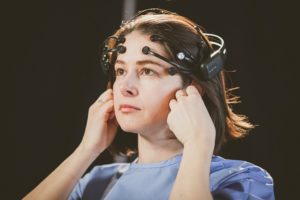Lenape in your bones: live performance and Indigenous language revitalization unite to make theatre history

By Jeff D’Hondt
TORONTO— A team of highly acclaimed Indigenous and non-Indigenous artists will literally vibrate bones to demonstrate the power of the Lenape language during Everything I Couldn’t Tell You, a history-making multi-media stage play presented May 4-12 as part of The RISER Project in Toronto.
For the first time ever, Lenape will be broadcast into bone conduction headsets. The devices resemble headphones one might wear while listening to music on a phone, with a crucial difference: the earbuds rest on cheekbones rather than the outer ear. The devices gently tickle bones, sending sound to the inner ear.
The experience approximates my experience of hearing Lenape for the first time at an Indigenous health conference in the 1990s. A colleague played me a cassette recording on her Sony Walkman, knowing I’d never heard my language. I ended up in my room crying for ten hours, releasing years of anguish and isolation from my culture.
My colleague had given me the cassette. I played it again and again on my own Walkman – it sounded like a comforting whisper, uttered to help me sleep peacefully. After ten hours, I felt two invisible hands caress my cheek. One felt like my grandpa’s. The other felt like my grandma’s.
The sound broadcast through the bone conduction headsets is a close approximation of what I experienced. The sound is somewhat muffled; resembling a whisper. The vibrations, when strong enough, can feel like a hand caressing a cheek, imitating the gentle touch of my grandparents.
Ten audience members a night selected by a lottery will get to wear the headsets, one for each hour that began my healing.
The play follows the story of Megan, played by Cree, Saulteaux, Scandinavian, French and Métis performer PJ Prudat, a brain-injured Indigenous woman determined to heal from her injuries.
Two neuroscientists, non-Indigenous Dr. Cassandra Barry, played by Canadian performer Jenny Young, and Lenape-speaking Dr. Alison Brant, played by Kanien’kehá:ka/Irish performer Cheri Maracle, battle their own trauma, and each other, while trying to perfect a highly experimental, technologically enhanced art therapy that might help Megan.
The play is directed by Erin Brandenburg and designed by a team of award-winning Indigenous and non-Indigenous designers who have created video, music, visual art and sound that further demonstrate how language heals us to the cell: audiences will see Megan’s brain as it heals, exposed to Lenape.
Fluent Lenape speakers will note that the text is filled with horrible vocabulary and grammar. My Lenape is awful. My aging brain and the lack of daily access to a fluent speaker are amongst the reasons I’ve struggled to learn.
Colonization also explains my inability to learn. The non-Indigenous world I grew up in taught me that Indigenous languages were a link to a painful past better forgotten. For years, attempting to speak it was a psychological battle with that internalized racism, fear and contempt. It’s been difficult to learn while I struggled with this oppressive anguish.
While writing, my first impulse was to reach out to the remaining speakers in Moraviantown to help me prepare a flawless translation. Instead, I decided that future iterations of the production will help me correct my deliberately flawed translation. But not in this production.
Handing an audience a script in perfect Lenape felt like hiding the impacts of colonization: “Indigenous people have their languages back! Yay! Thanks for the show!”
Instead, the audience will see and hear what happens when colonization assaults a language and the culture that birthed that language. I wish to present Lenape as I know it, to remind each of us that many Indigenous languages need the love Megan seeks from her therapists.
Everything I Couldn’t Tell You shows us the impact of that fight to preserve our languages, both positive and negative.
A fight that some audience members will literally feel in their bones.
The RISER Project is presented in the BMO Incubator at the Theatre Centre, 1115 Queen Street West in Toronto, May 4-12, 2018. The Theatre Centre sits on the traditional lands of the Anishinaabe, Haudenosaunee and Wendat peoples. For more information and tickets visit: tickets.theatrecentre.org


